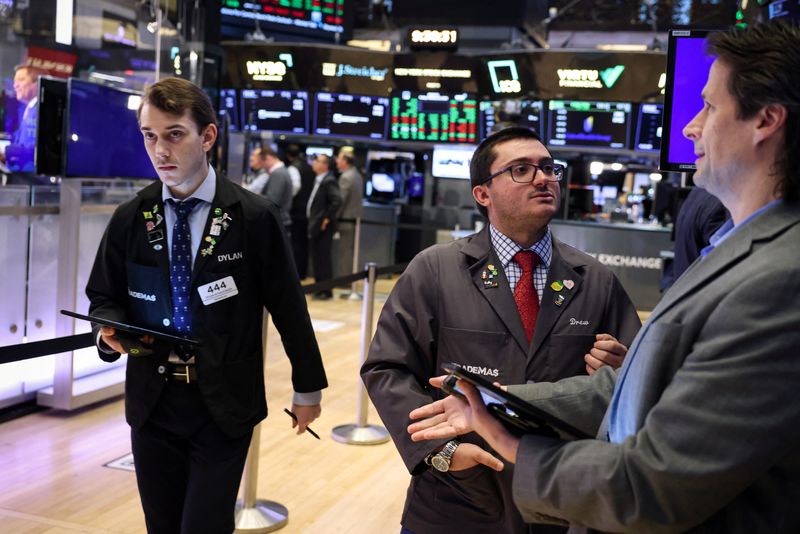By Chuck Mikolajczak
NEW YORK (Reuters) -U.S. stocks closed near flat on Tuesday ahead of inflation and other economic data that could shed light on the possible timing of a Federal Reserve interest rate cut.
As corporate earnings season winds down, investors refocused on economic data and the likely path of U.S. rates. Equities have been on a furious rally for weeks, fueled largely by enthusiasm about artificial intelligence-related stocks that lifted the S&P 500 and Dow Jones industrials to record levels while leaving the Nasdaq just short of a new high.
With the latest employment report not due until next week, the spotlight is on Thursday's January personal consumption expenditures price index (PCE), the Fed's preferred inflation gauge.
Should the PCE reading resemble recent inflation readings on consumer and producer prices, it could compel the Fed to hold rates at current levels longer than the market is anticipating.
On Monday, Kansas City Federal Reserve Bank President Jeffrey Schmid used a debut speech on policy to signal that he remains focused on the threat of high inflation and is in no rush to cut rates.
In addition, Fed Governor Michelle Bowman on Tuesday indicated she is in no hurry to cut rates, given upside risks to inflation that could stall progress or even cause price pressures to resurge.
"It's been toppy, it feels like it is clearly a little bit stretched," said Ken Polcari, managing partner at Kace Capital Advisors in Boca Raton, Florida.
"The market is getting at least attuned to the fact they are not going to get what they want and so it is backing up. ... You're going to see it fade in a hurry if the PCE number comes in as expected or hotter than expected."
The Dow Jones Industrial Average fell 96.82 points, or 0.25%, to 38,972.41. The S&P 500 gained 8.65 points, or 0.17%, at 5,078.18 and the Nasdaq Composite rose 59.05 points, or 0.37%, to 16,035.30.
Expectations for a cut of at least 25 basis points (bps) by the Fed at its June meeting stand at 59.1%, down from the near certainty at the end of January, according to the CME Group's (NASDAQ:CME) FedWatch tool.
Other data due this week which could help shape expectations from the Fed include the second estimate of gross domestic product, jobless claims and manufacturing activity.
U.S. consumer confidence retreated in February after a three-month gain, and orders for long-lasting U.S. manufactured goods fell more than expected in January, data on Tuesday showed.
Stocks gained some late support from Apple (NASDAQ:AAPL), which erased earlier declines to close up 0.81% after Bloomberg News reported the iPhone maker canceled work on its electric car, shifting some employees to its artificial intelligence project.
But UnitedHealth (NYSE:UNH) dropped just before the closing bell to end down 2.27% as the biggest drag on the Dow after WSJ reported the U.S. Department of Justice has launched an antitrust investigation into the company.
Viking Therapeutics surged 121.02% after its experimental drug to treat obesity helped patients achieve "significant" weight loss in a mid-stage study.
In turn, Amgen (NASDAQ:AMGN), which is also developing a weight-loss drug, lost 2.75%.
Advancing issues outnumbered decliners by a 1.45-to-1 ratio on the NYSE while on the Nasdaq, advancing issues outnumbered decliners by about 1.6-to-1.

The S&P 500 posted 46 new 52-week highs and no new lows while the Nasdaq recorded 253 new highs and 66 new lows.
Volume on U.S. exchanges was 11.21 billion shares, compared with the 11.71 billion average for the full session over the last 20 trading days.